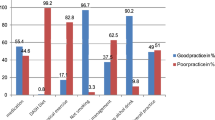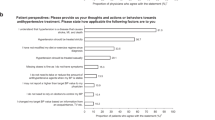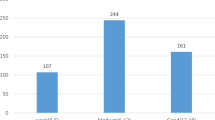Abstract
Although it has been proven that decreasing the arterial blood pressure decreases cardiovascular morbidity and mortality, <25% of hypertensive patients receiving antihypertensive treatment achieve target values, which are mainly attributed to failure of the patients to comply to treatment. Ensuring patient compliance to antihypertensive treatment, to prevent the development of hypertension-associated complications, has proven to be challenging in several countries. The aim of the present study was to investigate the knowledge, perceptions and practices applied by doctors treating hypertensive patients regarding patient compliance to the prescribed treatment. We also aimed to assess the possible barriers physicians face to using reinforcement methods and currently available guidelines. A total of 202 doctors from the Serres and Drama prefectures of Greece participated in this study. The data collection comprised a quantitative method questionnaire and the data were processed using Stata 8.0 statistical software. The results demonstrated that 84.7% of the participating doctors do not use the current guidelines for compliance, whereas only 10.1% have consultations lasting >15 min when discussing the medication with their patients. In addition, the majority (84.7%) of the doctors do not practice peer mentoring and consider the most effective interventions to be providing information and discussing the medication with their patients. In conclusion, the level of patient compliance to antihypertensive medication is unsatisfactory and the main reason is considered to be the non-use of guidelines by the treating physicians. Patients may benefit from further education of health professionals in this field.
This is a preview of subscription content, access via your institution
Access options
Subscribe to this journal
Receive 12 digital issues and online access to articles
$119.00 per year
only $9.92 per issue
Buy this article
- Purchase on Springer Link
- Instant access to full article PDF
Prices may be subject to local taxes which are calculated during checkout
Similar content being viewed by others
References
Burnier M . Medication adherence and persistence as the cornerstone of effective antihypertensive therapy. Am J Hypertens 2006; 19: 1190–1196.
Lowry KP, Dudley TK, Oddone EZ, Bosworth HB . Intentional and unintentional nonadherence to antihypertensive medication. Ann Pharmacother 2005; 39: 1198–1203.
Wroe AL . Intentional and unintentional non-adherence: a study of decision making. J Behav Med 2002; 25: 355–372.
Haynes RB, Montague P, Oliver T, McKibbon KA, Brouwers MC, Kanani R . Interventions for helping patients to follow prescriptions for medications. Cochrane Database Syst Rev 2000; (2): CD000011.
Zolnierek KBH, DiMatteo RM . Physician communication and patient adherence to treatment: a meta-analysis. Med Care 2009; 47 (8): 826–834.
World Health Organization. Adherence to Long-Term Therapies: Evidence for Action. World Health Organization: Geneva, Switzerland, 2003. http://www.emro.who.int/ncd/Publications/adherence_report.pdf. Accessed 1 August 2016.
Nielsen JO, Shrestha AD, Neupane D, Kallestrup P . Non-adherence to anti-hypertensive medication in low-and middle-income countries: a systematic review and meta-analysis of 92443 subjects. J Human Hypertens 2017; 31 (1): 14–21.
Andrade SE, Kahler KH, Frech F, Chan KA . Methods for evaluation of medication adherence and persistence using automated databases. Pharmacoepidemiol Drug Saf 2006; 15: 565–574.
Morgan SG, Yan L . Persistence with hypertension treatment among community-dwelling BC seniors. Can J Clin Pharmacol 2004; 11: e267–e273.
Bautista LE . Predictors of persistence with antihypertensive therapy: results from the NHANES. Am J Hypertens 2008; 21: 183–188.
Clyne W, Mshelia C, McLachlan S, Jones P, de Geest S, Ruppar T et al. A multinational cross-sectional survey of the management of patient medication adherence by European healthcare professionals. BMJ Open 2016; 6 (2): e009610.
Formoso G, Liberati A, Magrini N . Practice guidelines: useful and ‘participative’ method? Survey of Italian physicians by professional setting. Arch Intern Med 2001; 161 (16): 2037–2042.
Cabana MD, Rand CS, Powe NR, Wu AW, Wilson MH, Abboud PA et al, Why don't physicians follow clinical practice guidelines? A framework for improvement. J Am Med Assoc 1999; 282 (15): 1458–1465.
Almas A, Bhamani F, Khan AH . Better physician-patient communication; an important milestone in control of hypertension, a multicenter study from Karachi, Pakistan. J Coll Physicians Surg Pak 2014; 24 (12): 952–954.
Lüders S, Schrader J, Schmieder RE, Smolka W, Wegscheider K, Bestehorn K . Improvement of hypertension management by structured physician education and feedback system: cluster randomized trial. Eur J Cardiovasc Prev Rehabil 2010; 17 (3): 271–279.
Bergman-Evans B . AIDES to improving medication adherence in older adults. Geriatr Nurs 2006; 27 (3): 174–182.
Dezii CM . Medication noncompliance: what is the problem? Manag Care 2000; 9 (Suppl 9): S7–S12.
Kass MA, Meltzer DW, Gordon M, Cooper D, Goldberg J . Compliance with topical pilocarpine treatment. Am J Ophthalmol 1986; 101 (5): 515–523.
Miller ER, Erlinger TP, Young DR, Jehn M, Charleston J, Rhodes D et al. Results of diet, exercise, and weight loss intervention trial (DEW-IT). Hypertension 2002; 46: 612–618.
Van Wijk BL, Klungel OH, Heerdink ER, de Boer A . The association between compliance with antihypertensive drugs and modification of antihypertensive drug regimen. J Hypertens 2004; 22 (9): 1831–1837.
Harmon G, Lefante J, Krousel-Wood M . Overcoming barriers: the role of providers in improving patient adherence to antihypertensive medications. Curr Opin Cardiol 2006; 21 (4): 310–315.
Post DM, Cegala DJ, Miser WF . The other half of the whole: teaching patients to communicate with physicians. Fam Med 2002; 34 (5): 344–352.
Berben L, Bogert L, Leventhal ME, Fridlund B, Jaarsma T, Norekvål TM et al. Which interventions are used by health care professionals to enhance medication adherence in cardiovascular patients? A survey of current clinical practice. Eur J Cardiovasc Nurs 2011; 10 (1): 14–21.
Oliveria SA, Chen RS, McCarthy BD, Davis CC, Hill MN . Hypertension knowledge, awareness, and attitudes in a hypertensive population. J Gen Intern Med 2005; 20 (3): 219–225.
van Dulmen S, Sluijs E, van Dijk L, de Ridder D, Heerdink R, Bensing J . Patient adherence to medical treatment: a review of reviews. BMC Health Serv Res 2007; 7: 55.
Vermeire E, Hearnshaw H, Van Royen P, Denekens J . Patient adherence to treatment: three decades of research. A comprehensive review. J Clin Pharm Ther 2001; 26 (5): 331–342.
Alhalaiqa F, Deane KHO, Nawafleh AH, Clark A, Gray R . Adherence therapy for medication non-compliant patients with hypertension: a randomized controlled trial. J Hum Hypertens 2012; 26: 117–126.
Hughes S, Dennison CR . Progress in prevention: the other epidemic. J Cardiovasc Nurs 2009; 24 (6): 426–428.
Sung S, Lee S, Lee K, Kim DS, Kim KH, Kim KY . First-year treatment adherence among outpatients initiating antihypertensive medication in Korea: results of a retrospective claims review. Clin Ther 2009; 31 (6): 1309–1320.
Ram CV . Fixed-dose triple-combination treatments in the management of hypertension. Manag Care 2013; 22 (12): 45–55.
Ross S, Walker A, MacLeod MJ . Patient compliance in hypertension: role of illness perceptions and treatment beliefs. J Hum Hypertens 2004; 18 (9): 607–613.
Economou C . Greece: health system review. Health Syst Transit 2010; 12 (7): 1–180.
McLeroy KR, Bibeau D, Steckler A, Glanz K . An ecological perspective on health promotion programs. Health Educ Q 1988; 15: 351–77.36.
Cherry SB, Benner JS, Hussein MA, Tang SS, Nichol MB . The clinical and economic burden of nonadherence with antihypertensive and lipid-lowering therapy in hypertensive patients. Value Health 2009; 12 (4): 489–497.
Author information
Authors and Affiliations
Corresponding author
Ethics declarations
Competing interests
The authors declare no conflict of interest.
Rights and permissions
About this article
Cite this article
Barbouni, A., Nalmpanti, M., Gennimata, D. et al. Beliefs and practices of Greek doctors in relation to patients’ adherence to antihypertensive medication. J Hum Hypertens 31, 341–346 (2017). https://doi.org/10.1038/jhh.2016.84
Received:
Accepted:
Published:
Issue Date:
DOI: https://doi.org/10.1038/jhh.2016.84
This article is cited by
-
Doctors’ views and strategies to improve patients’ adherence to medication
Hormones (2021)
-
Why do patients follow physicians’ advice? The influence of patients’ regulatory focus on adherence: an empirical study in China
BMC Health Services Research (2019)
-
Adherence of doctors to hypertension clinical guidelines in academy charity teaching hospital, Khartoum, Sudan
BMC Health Services Research (2019)



